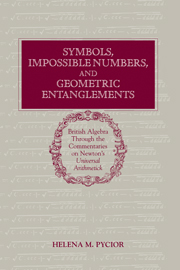 Symbols, Impossible Numbers, and Geometric Entanglements
Symbols, Impossible Numbers, and Geometric Entanglements Book contents
- Frontmatter
- Contents
- Acknowledgments
- Introduction
- 1 Setting the Scene
- 2 William Oughtred and Thomas Harriot
- 3 John Collins's Campaign for a Current English Algebra Textbook
- 4 John Pell's English Edition of Rahn's Algebra and John Kersey's Algebra
- 5 The Arithmetic Formulation of Algebra in John Wallis's Treatise of Algebra
- 6 English Mathematical Thinkers Take Sides on Early Modern Algebra
- 7 The Mixed Mathematical Legacy of Newton's Universal Arithmetick
- 8 George Berkeley at the Intersection of Algebra and Philosophy
- 9 The Scottish Response to Newtonian Algebra
- 10 Algebra “Considered As the Logical Institutes of the Mathematician”
- Epilogue
- Index
6 - English Mathematical Thinkers Take Sides on Early Modern Algebra
Thomas Hobbes and Isaac Barrow against John Wallis
Published online by Cambridge University Press: 05 December 2011
- Frontmatter
- Contents
- Acknowledgments
- Introduction
- 1 Setting the Scene
- 2 William Oughtred and Thomas Harriot
- 3 John Collins's Campaign for a Current English Algebra Textbook
- 4 John Pell's English Edition of Rahn's Algebra and John Kersey's Algebra
- 5 The Arithmetic Formulation of Algebra in John Wallis's Treatise of Algebra
- 6 English Mathematical Thinkers Take Sides on Early Modern Algebra
- 7 The Mixed Mathematical Legacy of Newton's Universal Arithmetick
- 8 George Berkeley at the Intersection of Algebra and Philosophy
- 9 The Scottish Response to Newtonian Algebra
- 10 Algebra “Considered As the Logical Institutes of the Mathematician”
- Epilogue
- Index
Summary
In late-seventeenth-century England there developed a geometric and synthetic backlash to the algebraic tradition established by Oughtred, Harriot, Pell, Kersey, and Wallis. Wallis, in particular, became entangled in an extended debate over the relative ranks of geometry and arithmetic, the appropriateness of using algebra to solve geometric problems, and the legitimacy of reasoning on symbols. The restive, pensive mood of the Scientific Revolution, combined with the lack of clear disciplinary lines, made such a debate possible and permitted its participants to roam freely over the mathematical, philosophical, and educational aspects of the new algebra.
The debate peaked prior to the publication of Wallis's Treatise, with critiques of his early writings by Thomas Hobbes (1588–1679) and Isaac Barrow (1630–1677). It was perhaps significant that Hobbes and Barrow were royalists, opponents of the Puritan movement with which Wallis had been so intimately connected. Moreover, both men craved certainty, in real life as well as in mathematics, and both men found that certainty in traditional geometry. Both saw themselves simultaneously as defenders of an enduring mathematical tradition with roots back to ancient Greece and as enlightened thinkers of the new age of science. Favoring geometry over arithmetic and algebra, and synthesis over analysis, they helped to lay the foundations for the preoccupation with geometry that was to mark British mathematical education through the early nineteenth century.
Still, neither thinker was a naive defender of the old mathematics. Hobbes's mathematical views were shaped by seventeenth-century respect for experience as a source of knowledge and his nominalist inclinations.
- Type
- Chapter
- Information
- Symbols, Impossible Numbers, and Geometric EntanglementsBritish Algebra through the Commentaries on Newton's Universal Arithmetick, pp. 135 - 166Publisher: Cambridge University PressPrint publication year: 1997
- 1
- Cited by


